Concerned about the quality of Thailand’s educational system, the kingdom’s education minister promised that a coming “revolution” in Thai education would deliver demonstrable results by 2015.
Speaking at the “Moving Forward with Education Reform” seminar at the Ravindara Resort & Spa in Pattaya Sept. 6, Chaturon Chaisaeng pledged that a committee that begins work Sept. 22 will deliver improvements in Program for International Students Assessment test scores, higher enrollment in vocational education, improved quality in university-level education and school enrollment by 2015, when Thailand is set to enter the Association of Southeast Asian Nations Economic Community.
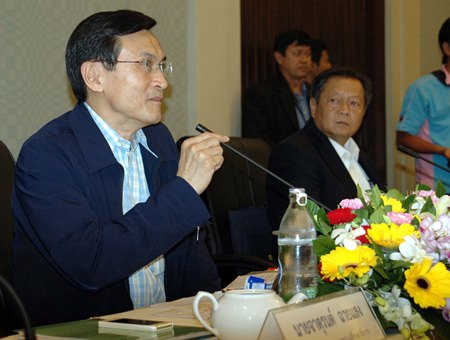 Minister of Education Chaturon Chaisaeng.
Minister of Education Chaturon Chaisaeng.
“The committee will draft a strategy for education reform that will push through a revolution in education,” Chaturon said.
The minister’s comments follow another damning report from the World Economic Forum showing Thailand’s primary and secondary education system has slipped even farther in world rankings. The country now ranks 78th out of 144 nations globally – and last among eight ASEAN countries – in quality of education.
In specific areas, the results were even worse. The kingdom ranks 101st in primary enrollment, 94th in secondary enrollment, 86th in the quality of its primary education, and 80th in the quality of its math and science education.
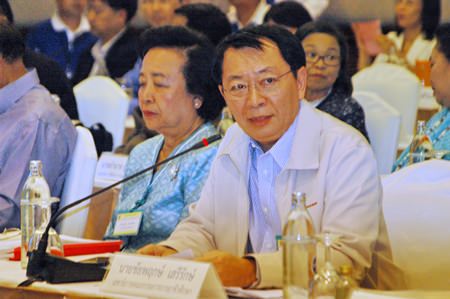 Chaiyapruek Saereerak, secretary for the Office of Vocational Education Commission.
Chaiyapruek Saereerak, secretary for the Office of Vocational Education Commission.
The WEF, in its report, cited “excessive red tape, omnipresent corruption and clientelism, low reliability” and policy instability among the myriad of reasons for the country’s weak educational system.
“Poor public health (74th) and education, two other critical building blocks of competitiveness, require urgent attention,” the report stated, adding that “enrollment in and the quality of higher education remain abnormally low.”
While expressing “shock” at the economic forum’s findings, no one can be genuinely surprised at the findings, as the country’s educational system has been on a well-documented downslide for years.
Results from the 2009 Organization for Economic Cooperation and Development PISA test saw Thai students average 421 in reading literacy, compared with an OECD-country average of 493. The average Thai science score was 425, compared with a global average of 501. In math, Thais scored 419, compared with an OECD average of 496.
While 2012 results of the triennial test will not be released until Dec. 3, ministry officials have already acknowledged last year’s scores were “unsatisfactory.”
Other organizations show the same. Thailand dropped from 46th in 2007 to 51st out of 57 countries in 2011 in an education-proficiency assessment by the International Institute for Management Development. In 2011, the Trends in International Mathematics and Science Study had Thais ranked 28th in math and 25th in science out of 45 countries. And Thailand’s own 2012 Ordinary National Educational Test showed that Mathayom 6 students scored less than half of the possible total in all main subjects.
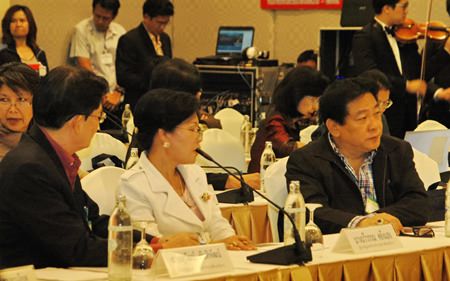
The poor results came despite Thailand spending more of its gross domestic product on education – 19.1 percent in 2012 – than most of its ASEAN rivals. But the WEF noted in its report that simply throwing money at educational problems – such as Thailand’s populist pledge to supply tablet computers to all students – isn’t the answer.
In Pattaya, Chaturon said a plethora of ministry committees and panels are studying the WEF report and brainstorming ideas to improve education, including implementing technology and seeking cooperation from the public to elevate standards.
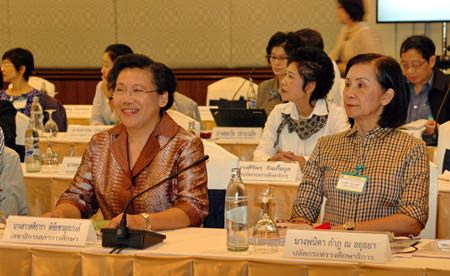
One way would be to simply get students out of mainstream education. Chaiyapruek Saereerak, secretary for the Office of Vocational Education Commission, echoed earlier published comments from Chinnapat Bhumirat, secretary-general of the ministry’s Office of Basic Education, that more students should opt instead for specialized vocational education.
“Thailand should urge students to apply for vocational training, but that will require cooperation from both OBEC and the Office of Private Education,” Chaiyapruek said. “The number of graduates must be increased. This is a problem faced by all ASEAN countries.”
Chaiyapruek admitted, however, that current vocational training needs improvement as well.
“If we look at the various indicators and evaluation of many agencies, not just the WEF, the VEC must rush to evaluate vocational-education schools to ensure they can produce personnel for green technology, solving poverty and operating businesses,” he said. “If that can be accomplished, there will be no problem with educational quality and internationalization.”
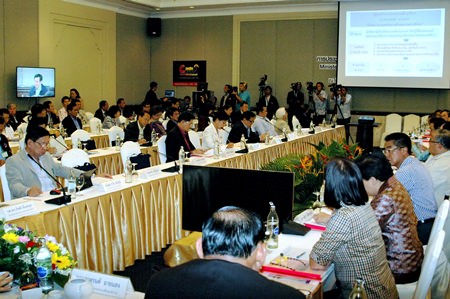
Such talk has been heard before. In fact, every poor test result in Thailand for the past 20 years has been followed by pronouncements of shock, promises of revolutions and the establishment of committees that go nowhere. But Chaiyapruek’s reference to “internationalization” – government-speak for the country’s international competitiveness once the AEC begins 15 months from now – may be the wild card that changes the whole reform game.
Thailand’s anxiety over joining the AEC is becoming more palpable by day. Nearly every event or “project” references the AEC. While they will never “lose face” by admitting it, many Thai government and business leaders know the country is unprepared for a unified market where rivals are better educated and speak better English.
“The goal in developing educational quality is to attack two areas,” Chaturon told the 200 government bureaucrats attending the Pattaya conference. “Students must be able to think, analyze and learn independently; and they must have the character and skills required for operating in the 21st century.”
The policies set out this month, he said, are aimed at improving Thai-language skills and pushing for quicker improvements in reading, writing and comprehension test scores. Chaturon pledged that results will become apparent for the Prathom 3 and 6 test scores in 2014, although improving PISA scores will take longer.
He said OBEC has declared 2014 as the “year of zero illiteracy” and will focus on improving enrollment and placing illiterate students in “intensive training” classes, only returning them to regular classrooms once they can read and write.
It’s estimated that Thailand had 1.6 million illiterate school-age youths in 2012. Only 89 percent of school-age children attended class in 2011, according to the World Bank.




